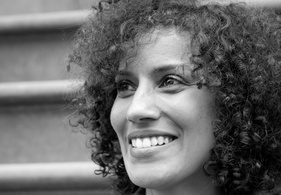|
Dear Readers,
Putting this series together has given me such faith in the poets in my age range. I was spoiled for choice when it came to finding poets who were both talented and hardworking - and I was amazed to discover how very humble nearly everyone I contacted was. Several brilliant poets even turned down my invitation to be on the list, on the grounds that they felt their current work wasn't strong enough. This project has humbled me, too: I agonized over which poets to include, whether or not I approached people correctly, and whether or not I did their work justice in my write-ups. But I'm happy with the result. I'm so glad so many of you read and followed this, and that you're as excited as I am to discover and celebrate the brilliant people in this field. Please keep it up: read these folks' books, read the awesome journals that publish them (including Muzzle, of course!), and go to their readings when you have the chance. It's my sincere belief that this is a crop of writers that will continue to grow in impressive ways. If you feel I missed someone I should know about or should better appreciate, don't hesitate to find me and point me towards her, or have the poet in question submit to Muzzle. We're always hungry to introduce our readers to new work. Below is a cheat sheet of all the listed poets' names. Their bios should enumerate recent or upcoming projects worth looking out for. --Laura Swearingen-Steadwell, Associate Editor * 1. Aricka Foreman 2. Traci Brimhall 3. Reginald Dwayne Betts 4. Tommye Blount 5. Jessica Helen Lopez 6. Sandra Beasley 7. Tarfia Faizullah 8. L. Lamar Wilson 9. Matthew Olzmann 10. Aimee Nezhukumatathil 11. Jamaal May 12. Kenyatta Rogers 13. John Paul Davis 14. Natalie Diaz 15. Roger Reeves 16. Jennifer Sperry-Steinorth 17. Jason Bayani 18. Bianca Spriggs 19. Tomás Morin 20. Nathan McClain 21. Nandi Comer 22. Ben Clark 23. Jonterri Gadson 24. Suzi Q. Smith 25. Nicky Beer 26. Rico Frederick 27. Nicole Sealey 28. Christina Olivares 29. Marcus Jackson 30. Aracelis Girmay  Although the quote wasn't originally hers, my brilliant roommate refers to Aracelis Girmay as "everybody's soul mate," and I'm inclined to agree. Readers at home may not know this about me, but I'm not really a joiner: I'm usually very skeptical about things everybody's trying, or everybody's interested in. I'm very rebellious. I don't even have a 401K, that's how rebellious I am. That being said, I did not want to like Girmay's poetry. I can't transcribe the actual feelings I had at the time I started hearing about her, but they were something like, "Sure, New Yorkers want to fold her laundry and kiss her toes, but fuck that worship noise." And I was so, so wrong. I'm not apologizing, folks: this woman is damn good. Although she's only in her 30s, Aracelis Girmay has already written some of the best poetry I've ever read. There are lines she's crafted that have absolutely changed the way I think about what's possible in language, and the way I move through the world. In an earlier post, I mentioned that I love watching writers in this age range experiment, but I also love when poets have found their own specific voices. I feel, strongly, that Girmay is in the latter category. This isn't to say that she doesn't experiment, but that her understanding of linguistics is exceptional. My first thought, on reading the poems she sent me, was something like, "What. The fuck. She's invented her own dialect." I had a hell of a time picking just one poem for this spotlight, because Girmay brings a different kind of light to each poem. If you don't know her work yet, know her now. Buy her books. Offer her peaches and dahlias. This is a poet who is growing the art as we speak. [To all you lovely readers: I'll have an afterword/summation finished in a day or so.] * sea near lampedusa -in memoriam for the eyes we closed & the freedom we wasted on things , for the terrors our acts lit into the wet retina of your memory, if you should call it that , for the years you behaved in a distance that was not quite distance, as we burned our fires, each other, & you, finally, handless, please—the silence is what we feed, is what burns in the bright absence of The Living they were, swollen in flowered shirts, & parkas, in boots meant for the earth, but not for you * Aracelis Girmay is the author of the poetry collections Teeth and Kingdom Animalia. Teeth was awarded the GLCA New Writers Award and Kingdom Animalia won the Isabella Gardner Poetry Award and was a finalist for the National Book Critics Circle Award. Girmay is also the author of the collage-based picture book changing, changing--which draws its momentum from Ovid's The Metamorphoses which begins (as translated by Ted Hughes): "Now I am ready to tell how bodies are changed/ Into different bodies." Girmay is the recipient of grants and fellowships from the Jerome Foundation, the National Endowment for the Arts, the Cave Canem Foundation, and the Civitella Ranieri Foundation, and she is on the faculty of Hampshire College's School for Interdisciplinary Arts.  When I lived in Chicago, I developed an appreciation for excellent storytelling. There are a number of storytelling shows and open mics in that town, and plenty of amazing storytellers. Sharing a good story well is one of the most important ways we have to connect with each other. Marcus Jackson knows how to tell a story well. He understands the essentials of narrative, choosing and expressing the appropriate details to give a story body without slowing it down. I think this poem in particular is a fantastic example of that strength in his work: if you look at Jackson's line breaks throughout the poem, many of them can be read as phrases unto themselves. Although his speaker's overriding tone is matter-of-fact, the breaks create a kind of quiet undertone that deepens the complexity of the story. Jackson's work is subtle, intelligent, and beautifully constructed. Please enjoy. * LULLABY to Jessica Fighting with Mama, Dad shattered a lamp, slammed the door, and headed to the Ottawa Tavern. Mama took you from your rickety crib, and we both sat on her lap, as she smoked and hummed in the unlit kitchen. Her Merit burned on the glass ashtray, while Dad arrived at the pub where the barmaid knew what he needed before he spoke. What was Mama thinking, her biceps bruised, her thin hair held back by a doubled-up rubber band? Is there a sure way to love a man the world won’t quit dealing trouble to? Why is the future a fog-faced thing, whose teeth we can’t see before being bitten? That night, Mama simply kept on humming—some song now lost in the long line of exhausted songs-- and she swayed, until sleep’s clean sheet wrapped the brains of her babies. * Marcus Jackson was born in Toledo, Ohio. He earned a BA from the University of Toledo and continued his poetry studies at NYU and as a Cave Canem fellow. His poems have appeared in such publications as The New Yorker, Harvard Review, and The Cincinnati Review. He lives with his wife and son in Nashville.  I love writing that infuses me with wonder. Fresh images, yes, startling metaphors, but please, language that moves in a brand new way. I want to wonder at the word and the world: I want “miracles [that] are treated as ordinary fact.” Christina Olivares writes wonderful poems. They're luminous. They're odd, but still graceful. Most of her signature work is characterized by careful structural fragmentation, with phrases and words floating in space. Although the poem posted here isn't written in that style, every phrase of this poem still feels singular, isolated in its own way even while it continues the narrative. I haven't totally figured out how Olivares does this, which is partly why her work is so marvelous, and why I want to read it again and again. The poem below was previously published in Tidal Basin Review, Spring 2012. * Havana I. Sea Wall The sea wall is the dividing line between Cuba and what is not Cuba. We gather, from all over the city, curl up on the wide ledge. Every night. Tonight the moon is full of sun and rising into the dark sky. My hands are full of sugared papitas. Closing in on the edge of shore, a boat whistles close. The guards stand on guard, peer over. A girl who likes girls slips her tongue against my earlobe while I dream about my lover. She reminds me of rain—husky vivid wind. But the night is so clear that instead of strings of sweet popcorn or kisses I put my hands out and gather the stars. I hear them, glass dreams beating on an old wind. It reminds me of something outside of my mind’s reach. The sea is a body that holds all of us. Hidden in her mouths, a wild singing. II. Tin wall They warn me he’ll throw bottles, cut me with a machete. Say he’s mal de nervios, fundido, loco. Ways of saying crazy. The colonial mansion he lives in has two bright holes the size of elephants, one a missing door, one a missing window. Each has propped against it a large rusted sheet of tin, stolen from some abandoned construction site, a signal of protection, but air and light and thieves slip in anyway. The neighbors say that he sold the iron on the indows, sold the doors, sold the glass, sold the appliances, sold the flooring my great grandfather had so diligently laid, sold the light fixtures, even sold the bathtubs. Later, he whispers to me, the communists said once, we can heal you if you work for us. You are going crazy because you have not submitted to the triumph of the revolution. There is one working door: hinge, padlock, knob: I know how these things go: you may not enter around the tin sheath. What pretends to be a wall must actually be treated like a wall, so I knock on the door. He answers, he’s been spying from the inside since he heard me talk to the neighbor. I show him pictures of the family through a slat in the door. He is my grandfather’s brother, he recognizes the faces in the pictures. He folds them carefully, like identification papers, inside a worn plastic bag that doubles as his wallet. I enter. The house is empty except for what’s decayed and what’s growing. He stacks empty plastic bottles by the door. He hides his machete inside the stove with no mouth. He writes a letter to my father that ends with, olvidate todo. He folds it carefully and slips it between my fingers, like this. His mind is a dismantled house. Before, he was a nuclear physicist. People have theories. When he smiles, all his teeth are missing. My touch goes through his eyes, threads along the rapid pulse of him. III. House Mess of flies and stink of offering in the cramped backyard, animals for sacrifice in cages. In the babalawos’ room, blue-blessed walls, sharp hunger of meat frying, beads and knives and bones and feathers and books. There are eight of us. A corner is stained in a long thin red streak, floor to ceiling. There is a baby girl, scrubbed clean, her head is too heavy for her neck, she is Sunday-polite in her lace jumper, her lace booties, her hair taut and oiled into three even braids. She is sick, so sick that when people pass they become quiet, so sick the jumpy stray wanders inside to lay beneath the chair where her grandmother sits. Her grandmother lifts my hand to join with hers and the little one, and we rock her together and wait in the heat as if for execution. The next day, after ceremony, she is healed, there is no trace, there was no medicine, it would have been a miracle, but miracles are treated as ordinary fact in this house. At some point they mashed coconut and put it against our heads. And we stood in circles of sunlight, quietly. Somebody wept and it pulled strings in our bodies like an old quiet thing. Hidden in our mouths, a wild singing, like this. * Christina Olivares is a poet and educator living in New York City. She earned an MFA from Brooklyn College in Poetry and a BA from Amherst College in Interdisciplinary Studies (Education). She is the recipient of a 2012 Vermont Studio Center Artists Grant, a 2010 Jerome Foundation Travel and Study Grant for Emerging Writers to Cuba, and 2008-2009 Teachers and Writers Collaborative Fellowship. She is a 2012 Best of the Net and a 2008 Pushcart Prize nominee. Her poems are published in Vinyl Poetry, PALABRA, Tidal Basin Review, The Acentos Literary Review, No, Dear, and The Brooklyn Review.  People are sometimes surprised to discover what awkward conversationalists poets can be. We blunder, we stumble, and time and again, we say the wrong thing. As with anyone, the language of poets is often ragged, filled with false starts and second thoughts. For some, writing pleases us because it's a chance for us to finally get the words right. Sometimes the writing I love best is that which is self-consciously sculpted, that speaks from the pedestal of Art. Nicole Sealey's work always gives me that impression. One of the defining features of Sealey's style is her poise: deliberate diction, and a cool, powerful tone. Whatever their origins, Sealey's speakers tend to know exactly who they are and what they want, and they're not afraid to say so. They give the impression of being self-made, with intention - and they have no fear of heights. Sealey's poems give us something to reach for and look up to, and that's one of the reasons this poet is such a star. The poem below was previously published in Jewish Currents’ chapbook, “The American Dream;” Summer 2013. * Legendary If you shoot an arrow and it goes real high, hooray for you. - Dorian Corey If Grable’s legs were billed at one million, I can’t see mine selling for less than two. If an unknown Norma Jean Mortenson can become Ms. Marilyn Monroe, who says a boy from Buffalo can’t flower into a her from Harlem? Hepburn did drag. Dietrich, too. But as you get older, you aim a little lower—delighted if a few are familiar with the myth of you. I know many a handsome broad in this godforsaken city fine with just waking in the morning to applaud another day. What they lack in legend they remedy with wigs and a weekend. *Dorian Corey was a performer featured in Paris Is Burning, a documentary about drag balls in 1980s Harlem. * Born in St. Thomas, U.S.V.I. and raised in Central Florida, Nicole Sealey is a Cave Canem graduate fellow whose work was selected for inclusion in Best New Poets 2011. Winner of the 2012 Poetry International Prize and finalist for the 2011 Third Coast Poetry Prize, her poems have appeared in Callaloo, Harvard Review, Ploughshares, and Third Coast, among other literary online and print journals. She is currently an MFA candidate in poetry at New York University. |
Archives
June 2024
Categories |

 RSS Feed
RSS Feed